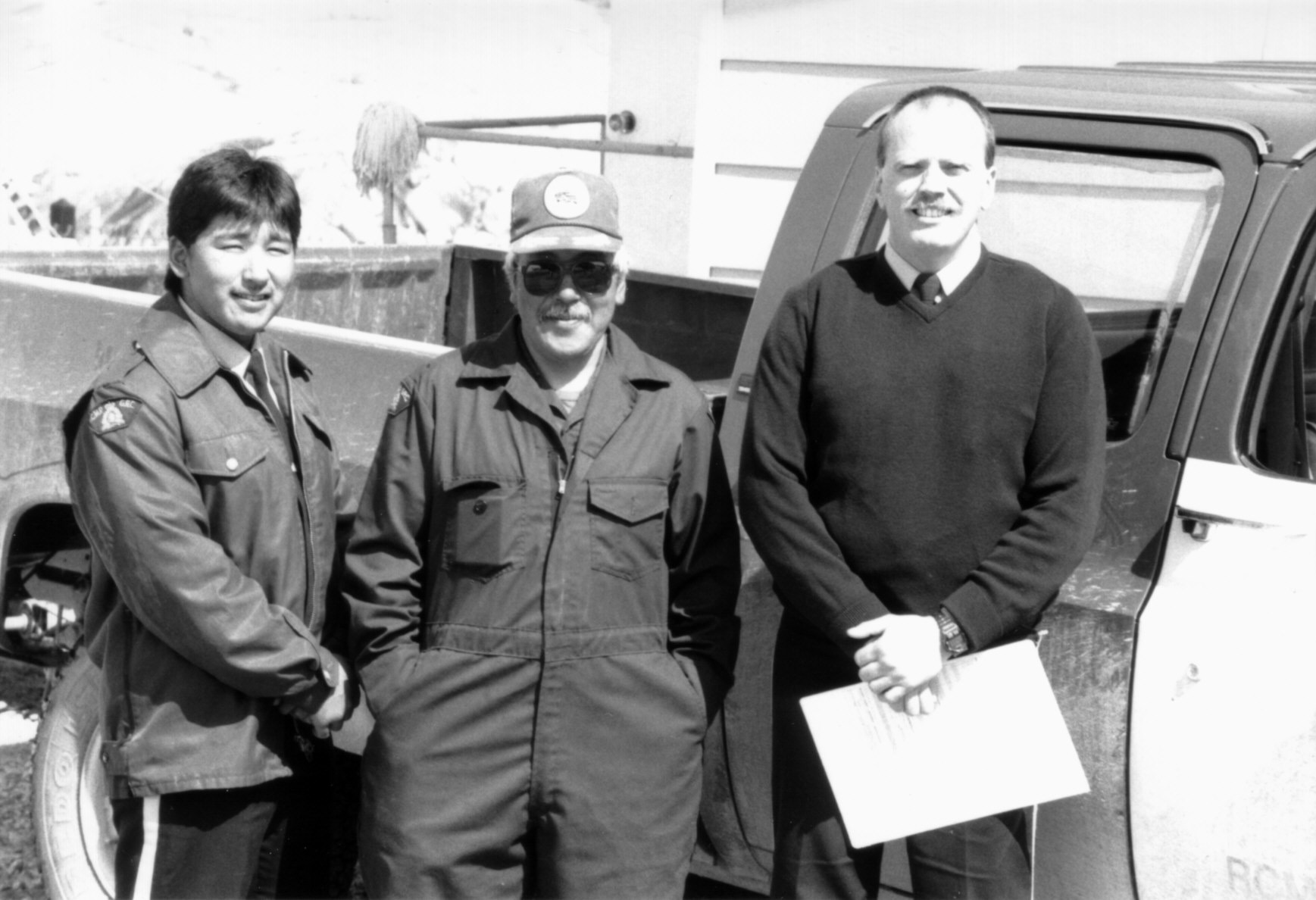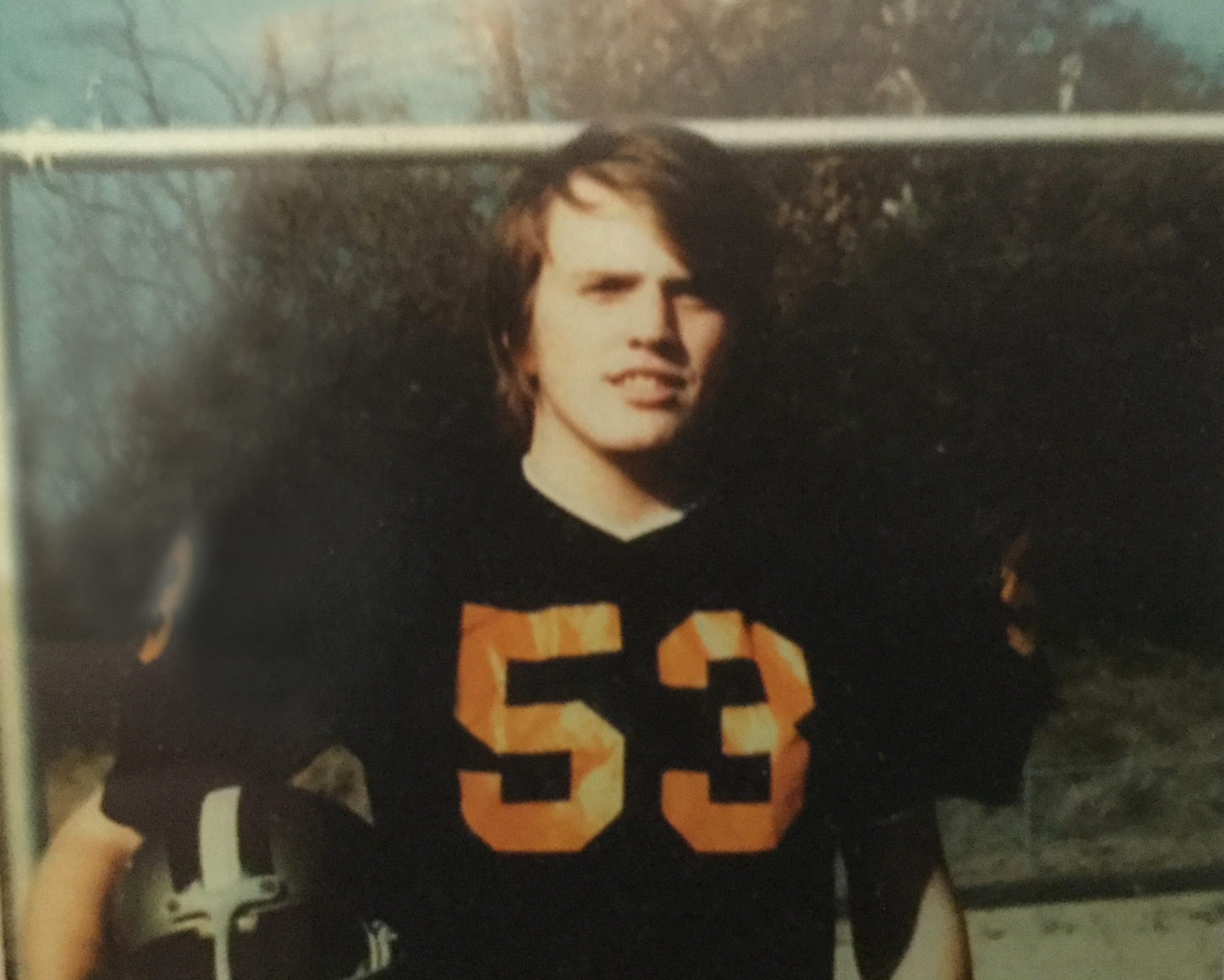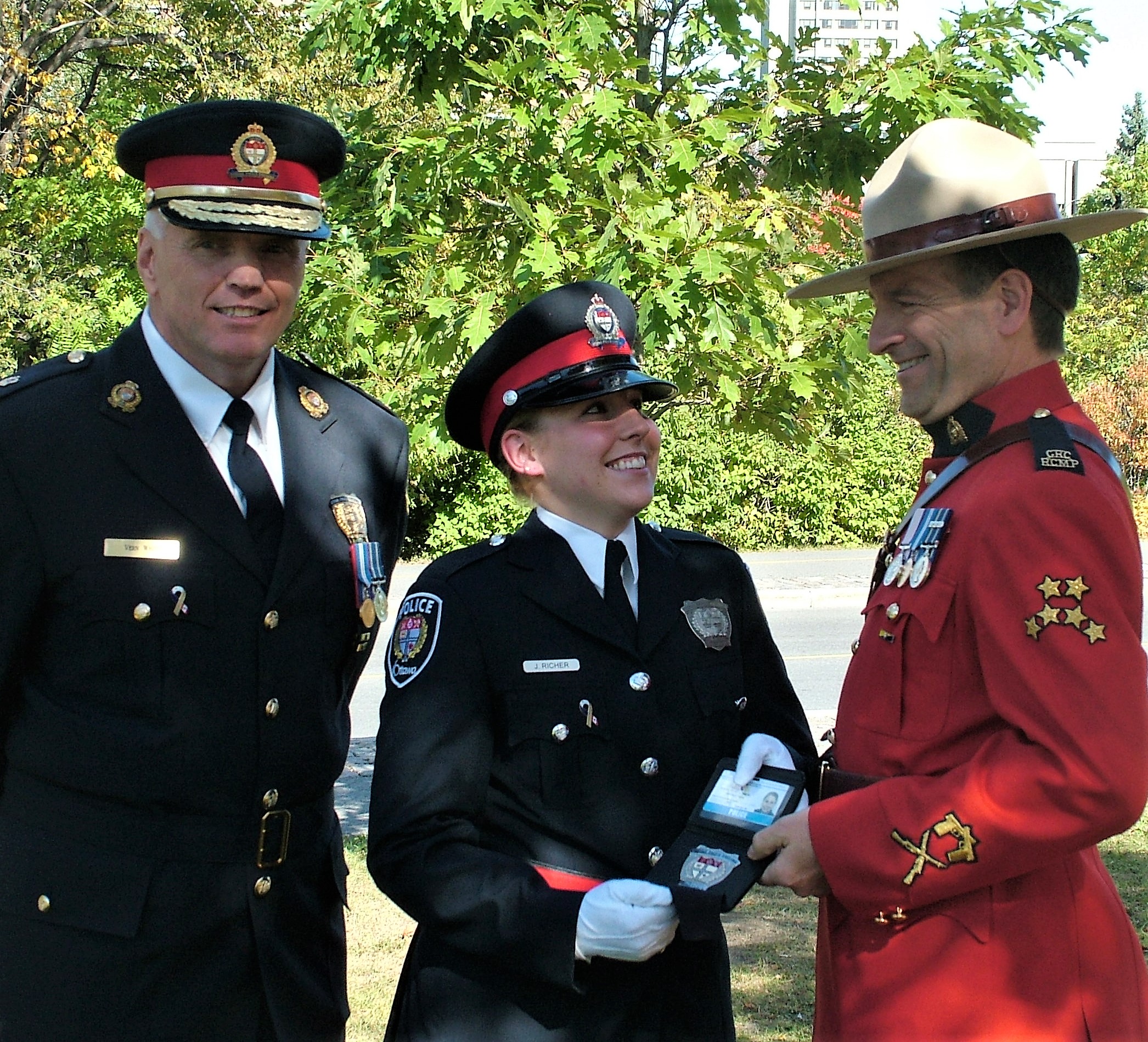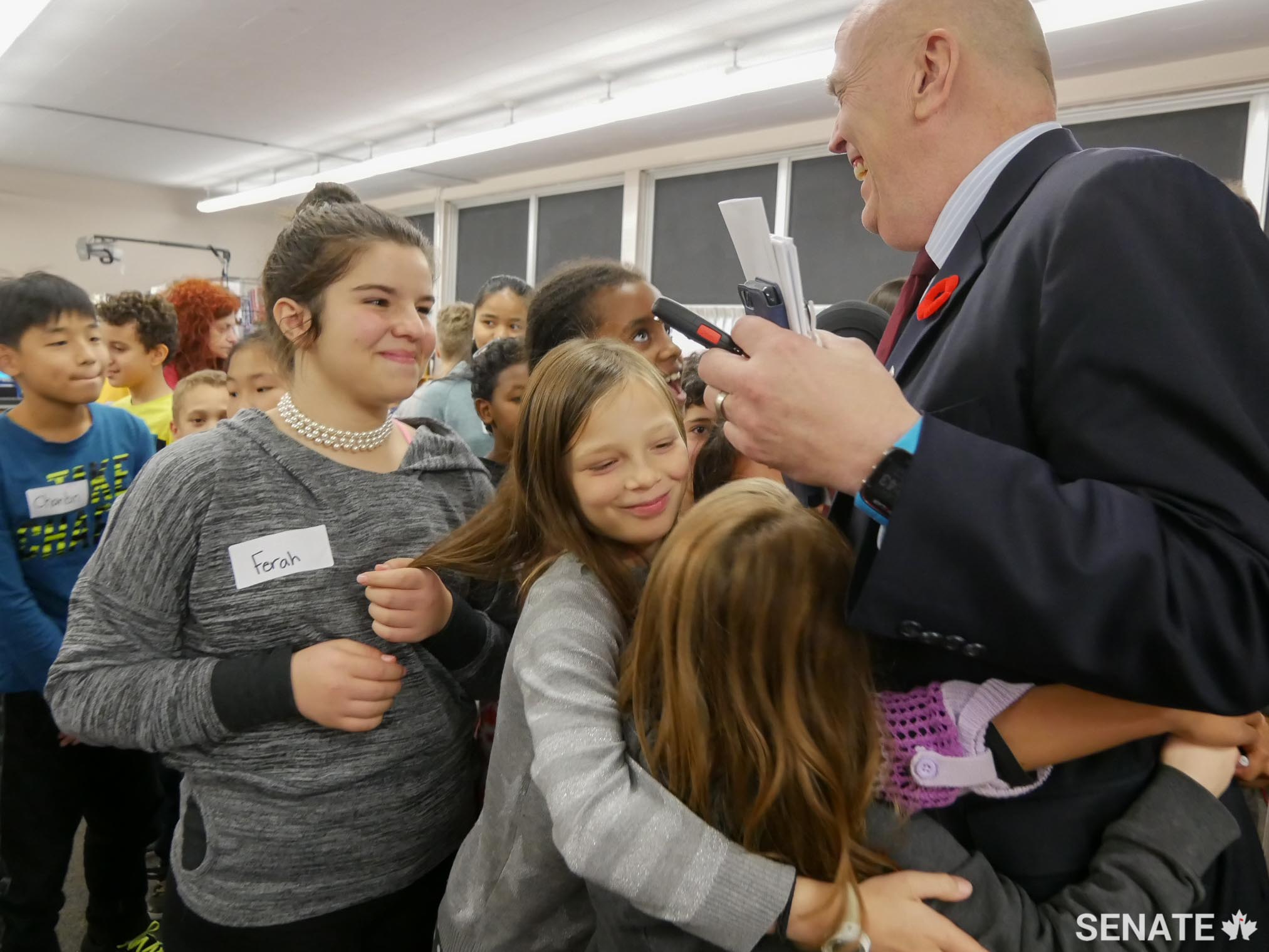Meet Senator Vern White

Before he was appointed to the Red Chamber, Senator Vern White spent more than three decades fighting crime. He served as Chief of the Ottawa Police Service as well as the Durham Regional Police Service, and spent 24 years with the RCMP, leaving the force with the rank of assistant commissioner.
Senator White has been a member of the National Security and Intelligence Committee of Parliamentarians (NSICOP) since its formation during the 42nd Parliament. The committee provides a review function of Canada’s national security and intelligence organizations.
Senator White was appointed to the Senate on February 20, 2012.
Who inspired you to get involved in public life?
Growing up, my mom felt that we should be engaged in community activities, whether it’s helping a church to fundraise or going door-to-door to raise money for the cancer society, which I did.
When I was 20, I worked as a bartender in Nova Scotia and these two plainclothes police officers used to come into the pub late on Friday nights. One was with the RCMP and the other was an officer with the Sydney city police. They would work until midnight in a specialized unit and come to play pool while I was cleaning up. Growing up where I grew up, you didn’t see police unless they were there to drag somebody away. They convinced me to go on a ride-along with them. It was the first of many and those ride-alongs really showed me that anybody can have a real impact. There wasn’t a day that I wasn’t at the RCMP detachment, begging them to take me with them just to go out for a few hours. I think I did a few hundred hours of ride-alongs before getting into the RCMP myself. I quickly realized there was a job out there where you can make a difference.
 Senator White, then a corporal with the RCMP, with Special Const. Sandy Akavak, centre, and Perry Ikkidluak, a summer student, in Kimmirut, Nunavut, in 1991. Senator White worked for the RCMP from 1981 to 2006.
Senator White, then a corporal with the RCMP, with Special Const. Sandy Akavak, centre, and Perry Ikkidluak, a summer student, in Kimmirut, Nunavut, in 1991. Senator White worked for the RCMP from 1981 to 2006.
Is there something about you that most Canadians might not know?
When I was 17, I spent a year in Millington, Tenn. as a Rotary exchange student in Grade 12. It gave me a lot of confidence when it comes to being outside of your comfort zone. It was the first time I was on an airplane and the first time I was outside of Nova Scotia. Every month, I lived with a different family.
In 1976, it was not far into desegregated schools in the United States. Our school had about 2,000 students and there were riots between Black people and white people, which was new to me. It was a big shock in the beginning for me, the anger and hatred between two groups of people. It was quite scary in the beginning. I was on the school football team and even the players would self-segregate.
 Senator White played football at the high school level when he was an exchange student in Millington, Tenn. in 1976.
Senator White played football at the high school level when he was an exchange student in Millington, Tenn. in 1976.
I was a bit lost because I didn’t have a life experience to connect to it. It was really difficult for me to put it into perspective.
What are the biggest public policy issues that are facing Canada today?
The coronavirus pandemic is an ultramarathon, not a 100-metre sprint. I believe we’ll find a vaccine, but at the end of all of that we will have been changed for our lifetime. This pandemic is an awakening for all of us. Public policy-wise, we are going to have to see some discussions about our own supply chains — having such a large amount of our supply chains offshore makes it very difficult in times like this. I visited countries in northern Europe that have similar supply chains to ours, but they still have a lot of things that they keep within their country to support their economy, even though they pay more for those items.
We’ll also have to get back into the discussion about drug addiction, in particular, the opioid overdoses — a problem that hasn’t gone away. We’re going to have to get back to some serious dialogue and public policy discussions to manage the addiction and drive down the death rates.
With your experience as a police officer, what can the Senate do to enhance public safety after the April 2020 mass shooting in Nova Scotia?
First, what a tragedy that was. Having grown up in small town Nova Scotia, I can only imagine what people are feeling around those communities. My heart goes out to people who were affected by this tragedy as well as the family of the RCMP officer who was killed.
From a public safety perspective, I appreciate the fact that we are going to continue to drive out gun control legislation or regulations that will try to diminish the risk. I still think that one of our biggest challenges is the movement of illegal guns between the U.S. and Canada. People have often talked about Japan being one of the safest places in the world from a gun crime perspective. You could say the same thing about New Zealand and Australia. What people forget is all three of those countries are surrounded by water. It’s much easier to manage a border when you have an ocean between you and anyone else. We need to figure out how to manage the illegal trade of guns from the U.S. into Canada better than we do right now.
Most of the weapons used by the gunman in the Nova Scotia shooting were from the U.S. and were not possessed legally by him. We need a better solution. If it’s an easy purchase in the U.S., then it’s an easy transaction into Canada. We need enhanced penalties for people caught doing that so that it’s a deterrent. We also need better intelligence sharing, whether it’s border services, police agencies and others.
Tracing would also allow authorities to trace a gun from a crime scene even though it came from the U.S. We had a case in Ottawa a few years ago where two guys were gunned down in a local motel and we were able to trace that firearm back to a purchase that was done in Maine. The individual who purchased it legally there and sold it illegally got five years in jail, if I remember correctly. That’s the kind of connectivity that we need to start working on — we’re not doing a very good job of that right now.
What legislative or committee work are you most proud of?
The recent annual report from the National Security and Intelligence Committee of Parliamentarians (NSICOP), of which I am a member, did a great job on the subject of foreign interference in Canada. The heads of the Canadian Security Intelligence Service (CSIS) spoke about this seven years ago, that we have interference at every level from other governments. When they revealed that, I think it shocked a lot of Canadians. I’m proud of the fact that we went into quite an in-depth discussion around it and I know it was very well-received by experts in the field.
The work is non-partisan — you wouldn’t know what party parliamentarians belong to in those committee meeting rooms. We’re so focused on getting our work done.
 Senator White smiles with RCMP Staff Sgt. Marc Richer, whose daughter, Const. Julie Richer, was sworn into the Ottawa Police Service on September 9, 2009. Senator White was chief of the Ottawa Police Service from 2007 to 2012.
Senator White smiles with RCMP Staff Sgt. Marc Richer, whose daughter, Const. Julie Richer, was sworn into the Ottawa Police Service on September 9, 2009. Senator White was chief of the Ottawa Police Service from 2007 to 2012.
What is a hidden gem in your region that more Canadians need to know about?
The Algonquin Park area is beautiful. It’s probably as big as some provinces. It’s a massive piece of land as diverse north to south as it is east to west with lakes, great hiking, great camping. It’s probably an area most Ontarians don’t connect to enough.
Did your background in policing come in handy in your role as a member of NSICOP?
In the opioid precursor legislation, I think it was very helpful that I was able to explain what it meant and the impact it was having on the mortality rate. I was able to help with a lot of the legislation that came through the legal affairs committee when former senator Bob Runciman was the chair, because I had a policing background that brought clarity to some of the issues. I was able to offer the same insight for the impaired driving legislation.
What is a song or album that always makes you smile and why?
I’m from Cape Breton Island so anything by Rita MacNeil makes me cry as much as it makes me smile. My dad worked as a coal miner for 38 years so anything about coal mining or working men is what I love to hear. “Working Man” is my favourite; it almost makes me emotional.
What was the last movie you saw?
I recently watched Contagion during the pandemic, which I never thought I would watch. I watch a lot of movies on the treadmill.
Which sports teams do you support?
The Ottawa Senators, obviously. When I arrived here in 2007, they were in the middle of the Stanley Cup finals against Anaheim so they were easy to get into. It’s much more difficult today to cheer on the team, but over the next few years I think they’re going to be a better team than they have been. I’m also a bit of a Raptors fan and it was great to see them win last year.
Why are you proud to be Canadian?
I travel quite a bit and no matter where I go in the world, I bump into people who have dealt with Canadians, typically in an international environment. I was in Australia speaking at a military event a couple of years ago and there were a number of soldiers who said when they were in Afghanistan they always wanted to connect with the Joint Task Force 2 (JTF2) special operations officers from Canada because they were always willing to help out and support them. They had their back. And I met people from Cyprus talking about the Cypriot civil war and the Canadians even stopping brothers from killing each other. It just doesn’t seem to matter where you go, you bump into people talking about Canada doing great things, and that makes me proud.
 Senator White gets hugs from Grade 4, 5 and 6 students at Arch Street Public School in Ottawa on November 2, 2017. The senator visited the school to speak about his role as a senator and about his previous career as a police officer.
Senator White gets hugs from Grade 4, 5 and 6 students at Arch Street Public School in Ottawa on November 2, 2017. The senator visited the school to speak about his role as a senator and about his previous career as a police officer.
Note to readers: The Honourable Vern White retired from the Senate of Canada in October 2022. Learn more about his work in Parliament.
Related articles
Tags
Committee news
Meet Senator Vern White

Before he was appointed to the Red Chamber, Senator Vern White spent more than three decades fighting crime. He served as Chief of the Ottawa Police Service as well as the Durham Regional Police Service, and spent 24 years with the RCMP, leaving the force with the rank of assistant commissioner.
Senator White has been a member of the National Security and Intelligence Committee of Parliamentarians (NSICOP) since its formation during the 42nd Parliament. The committee provides a review function of Canada’s national security and intelligence organizations.
Senator White was appointed to the Senate on February 20, 2012.
Who inspired you to get involved in public life?
Growing up, my mom felt that we should be engaged in community activities, whether it’s helping a church to fundraise or going door-to-door to raise money for the cancer society, which I did.
When I was 20, I worked as a bartender in Nova Scotia and these two plainclothes police officers used to come into the pub late on Friday nights. One was with the RCMP and the other was an officer with the Sydney city police. They would work until midnight in a specialized unit and come to play pool while I was cleaning up. Growing up where I grew up, you didn’t see police unless they were there to drag somebody away. They convinced me to go on a ride-along with them. It was the first of many and those ride-alongs really showed me that anybody can have a real impact. There wasn’t a day that I wasn’t at the RCMP detachment, begging them to take me with them just to go out for a few hours. I think I did a few hundred hours of ride-alongs before getting into the RCMP myself. I quickly realized there was a job out there where you can make a difference.
 Senator White, then a corporal with the RCMP, with Special Const. Sandy Akavak, centre, and Perry Ikkidluak, a summer student, in Kimmirut, Nunavut, in 1991. Senator White worked for the RCMP from 1981 to 2006.
Senator White, then a corporal with the RCMP, with Special Const. Sandy Akavak, centre, and Perry Ikkidluak, a summer student, in Kimmirut, Nunavut, in 1991. Senator White worked for the RCMP from 1981 to 2006.
Is there something about you that most Canadians might not know?
When I was 17, I spent a year in Millington, Tenn. as a Rotary exchange student in Grade 12. It gave me a lot of confidence when it comes to being outside of your comfort zone. It was the first time I was on an airplane and the first time I was outside of Nova Scotia. Every month, I lived with a different family.
In 1976, it was not far into desegregated schools in the United States. Our school had about 2,000 students and there were riots between Black people and white people, which was new to me. It was a big shock in the beginning for me, the anger and hatred between two groups of people. It was quite scary in the beginning. I was on the school football team and even the players would self-segregate.
 Senator White played football at the high school level when he was an exchange student in Millington, Tenn. in 1976.
Senator White played football at the high school level when he was an exchange student in Millington, Tenn. in 1976.
I was a bit lost because I didn’t have a life experience to connect to it. It was really difficult for me to put it into perspective.
What are the biggest public policy issues that are facing Canada today?
The coronavirus pandemic is an ultramarathon, not a 100-metre sprint. I believe we’ll find a vaccine, but at the end of all of that we will have been changed for our lifetime. This pandemic is an awakening for all of us. Public policy-wise, we are going to have to see some discussions about our own supply chains — having such a large amount of our supply chains offshore makes it very difficult in times like this. I visited countries in northern Europe that have similar supply chains to ours, but they still have a lot of things that they keep within their country to support their economy, even though they pay more for those items.
We’ll also have to get back into the discussion about drug addiction, in particular, the opioid overdoses — a problem that hasn’t gone away. We’re going to have to get back to some serious dialogue and public policy discussions to manage the addiction and drive down the death rates.
With your experience as a police officer, what can the Senate do to enhance public safety after the April 2020 mass shooting in Nova Scotia?
First, what a tragedy that was. Having grown up in small town Nova Scotia, I can only imagine what people are feeling around those communities. My heart goes out to people who were affected by this tragedy as well as the family of the RCMP officer who was killed.
From a public safety perspective, I appreciate the fact that we are going to continue to drive out gun control legislation or regulations that will try to diminish the risk. I still think that one of our biggest challenges is the movement of illegal guns between the U.S. and Canada. People have often talked about Japan being one of the safest places in the world from a gun crime perspective. You could say the same thing about New Zealand and Australia. What people forget is all three of those countries are surrounded by water. It’s much easier to manage a border when you have an ocean between you and anyone else. We need to figure out how to manage the illegal trade of guns from the U.S. into Canada better than we do right now.
Most of the weapons used by the gunman in the Nova Scotia shooting were from the U.S. and were not possessed legally by him. We need a better solution. If it’s an easy purchase in the U.S., then it’s an easy transaction into Canada. We need enhanced penalties for people caught doing that so that it’s a deterrent. We also need better intelligence sharing, whether it’s border services, police agencies and others.
Tracing would also allow authorities to trace a gun from a crime scene even though it came from the U.S. We had a case in Ottawa a few years ago where two guys were gunned down in a local motel and we were able to trace that firearm back to a purchase that was done in Maine. The individual who purchased it legally there and sold it illegally got five years in jail, if I remember correctly. That’s the kind of connectivity that we need to start working on — we’re not doing a very good job of that right now.
What legislative or committee work are you most proud of?
The recent annual report from the National Security and Intelligence Committee of Parliamentarians (NSICOP), of which I am a member, did a great job on the subject of foreign interference in Canada. The heads of the Canadian Security Intelligence Service (CSIS) spoke about this seven years ago, that we have interference at every level from other governments. When they revealed that, I think it shocked a lot of Canadians. I’m proud of the fact that we went into quite an in-depth discussion around it and I know it was very well-received by experts in the field.
The work is non-partisan — you wouldn’t know what party parliamentarians belong to in those committee meeting rooms. We’re so focused on getting our work done.
 Senator White smiles with RCMP Staff Sgt. Marc Richer, whose daughter, Const. Julie Richer, was sworn into the Ottawa Police Service on September 9, 2009. Senator White was chief of the Ottawa Police Service from 2007 to 2012.
Senator White smiles with RCMP Staff Sgt. Marc Richer, whose daughter, Const. Julie Richer, was sworn into the Ottawa Police Service on September 9, 2009. Senator White was chief of the Ottawa Police Service from 2007 to 2012.
What is a hidden gem in your region that more Canadians need to know about?
The Algonquin Park area is beautiful. It’s probably as big as some provinces. It’s a massive piece of land as diverse north to south as it is east to west with lakes, great hiking, great camping. It’s probably an area most Ontarians don’t connect to enough.
Did your background in policing come in handy in your role as a member of NSICOP?
In the opioid precursor legislation, I think it was very helpful that I was able to explain what it meant and the impact it was having on the mortality rate. I was able to help with a lot of the legislation that came through the legal affairs committee when former senator Bob Runciman was the chair, because I had a policing background that brought clarity to some of the issues. I was able to offer the same insight for the impaired driving legislation.
What is a song or album that always makes you smile and why?
I’m from Cape Breton Island so anything by Rita MacNeil makes me cry as much as it makes me smile. My dad worked as a coal miner for 38 years so anything about coal mining or working men is what I love to hear. “Working Man” is my favourite; it almost makes me emotional.
What was the last movie you saw?
I recently watched Contagion during the pandemic, which I never thought I would watch. I watch a lot of movies on the treadmill.
Which sports teams do you support?
The Ottawa Senators, obviously. When I arrived here in 2007, they were in the middle of the Stanley Cup finals against Anaheim so they were easy to get into. It’s much more difficult today to cheer on the team, but over the next few years I think they’re going to be a better team than they have been. I’m also a bit of a Raptors fan and it was great to see them win last year.
Why are you proud to be Canadian?
I travel quite a bit and no matter where I go in the world, I bump into people who have dealt with Canadians, typically in an international environment. I was in Australia speaking at a military event a couple of years ago and there were a number of soldiers who said when they were in Afghanistan they always wanted to connect with the Joint Task Force 2 (JTF2) special operations officers from Canada because they were always willing to help out and support them. They had their back. And I met people from Cyprus talking about the Cypriot civil war and the Canadians even stopping brothers from killing each other. It just doesn’t seem to matter where you go, you bump into people talking about Canada doing great things, and that makes me proud.
 Senator White gets hugs from Grade 4, 5 and 6 students at Arch Street Public School in Ottawa on November 2, 2017. The senator visited the school to speak about his role as a senator and about his previous career as a police officer.
Senator White gets hugs from Grade 4, 5 and 6 students at Arch Street Public School in Ottawa on November 2, 2017. The senator visited the school to speak about his role as a senator and about his previous career as a police officer.
Note to readers: The Honourable Vern White retired from the Senate of Canada in October 2022. Learn more about his work in Parliament.


